

Diverse Contexts & Formats
English Now! learning circles meet in urban, suburban, and rural settings in community colleges, adult learning programs, libraries, union halls, and child care centers across the United States. Programs address a multitude of learner and programmatic needs, and develop new and creative learning circle formats to meet those needs. In 2020, programs offered remote learning circles when meeting in person was not possible. Many programs have said they will keep the remote format option available for learning communities who prefer it, even once they are able to meet in person.
Read about how individual programs have implemented a variety of learning circles, using the flexible English Now! framework to craft learner-centered and program-centric learning circles.
Program Profiles
Motivated multi-level learners use digital tools to advance
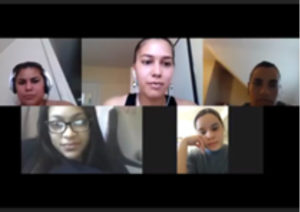
In the English Now! learning circles at the Genesis Center in Providence, RI, in 2020 participants successfully navigated several online platforms during each meeting. Learners used WhatsApp to connect at the session’s start where the facilitator posted pictures of their assignment from USA Learns or My English Lab as well as that day’s Zoom link.They moved to Zoom to check in, then opened their online learning platform for thirty minutes of independent work before coming back together for group work on Zoom.
Making the most of group time gave learners a chance to share and build community. Participants were multi-level English learners who were drawn from waiting lists or who had opted for the learning circle instead of a regular class. The program found that learners who moved on to the regular, more intensive classes have proven to be very motivated, independent learners with some of the highest attendance and retention rates in the program.
Learners build leadership skills and community
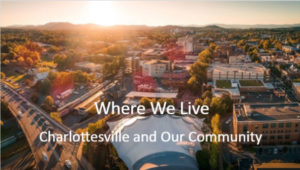
Thomas Jefferson Adult & Career Education (TJACE) at Piedmont Virginia Community College in Charlottesville, VA originally piloted English Now! learning circles in January 2018 with theintention of serving learners on waitlists for traditional classes. However, over time they realized that learning circles also appeal to learners who want to extend their learning time and those who cannot attend traditional classes. With learners solely using mobile phones, the learning circle embraced using language learning apps for content, including the XPRIZE award winning apps for adult literacy. Learners assumed leadership roles as “App Ambassadors,” showing students in the regular classes how to download and use the XPRIZE Adult Literacy apps, which were available for free during this period. When faced with the pandemic, the circle moved quickly to a virtual class using a group learning format. The learning circle decided on a theme called “Charlottesville and Where We Live” with a virtual guest speaker program to help answer questions and concerns about the pandemic and related issues. Over the course of the learning circle, participants requested speakers who would address their interests like visiting local parks and historic sites, evidence of this learning circle’s journey from trauma to healing together.
Resources:
https://worlded.org/six-tips-for-hosting-virtual-english-now-learning-circles/
Program-wide use of learning circles
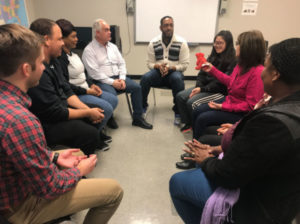
Since participating in the English Now! pilot in 2016, The Notre Dame Education Center (NDEC) in South Boston, MA has run over twenty different learning circles.NDEC started out offering learning circles for English Language Learners who were on waiting lists for their regular ESOL classes, but when learning circles proved to be popular with both staff and students, they decided to use the model in part, or as a whole, in a number of focused areas. Traditional ESOL classes developed or evolved into such courses as English for Success, English for Career Development, English Conversation in Current Events, and English for Civic Understanding and Engagement. They scaffold their healthcare and technology courses by offering mini-learning circles such as Medical Terminology, Cultural Diversity in Health Care, Intro to Technology (Tech Goes Home), Customer Service Skills (Banking and Hospitality), and Professionalism in the Workplace.
Learners field test app for work-contextualized English
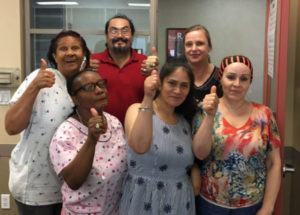
Learners in this labor-management sponsored learning circle were working as home health aides, so meeting once-a-week was perfect, as Maria Luisa Castañeda, the program director, notes,“Because the work schedules of the learners, home health aides, are so varied, they can’t attend regular (more intensive) classes. Learning circles met their needs.” The 1199 Home Care Industry Education Fund, Service Employees International Union (SEIU) in New York City, offered English Now! learning circles to its members in 2019.
All the learners had smartphones, as these were required for their work, and they discovered that these devices could also help them with English language learning online. They became autonomous learners outside of class, while during sessions of the learning circles, many of them had the opportunity to interact with computer technology for the first time in the computer lab, learning to use the keyboard and write and send email. In the third learning circle round, learners accessed an app-based English course for home health aides, newly-developed by the union in partnership with Cell-Ed. This was a win-win situation for the program as learners were able to field-test this new content and provide useful feedback, and for the learners, who now had access to specific work-contextualized English on their smartphones. The program developed bilingual instructions in English and Spanish on how to download an app, and app reflection sheets to support participants in thinking about their learning.
Flexible learning circle sizes a good fit
In 2020, residents of rural Montgomery County, MD, found there was a long wait for English language tutoring from The Literacy Council of Montgomery County (LCMC). The LCMC offers English Language Learners one-on-one tutoring from trained volunteers, adult education classes and other programming. In an effort to serve these learners on the waiting list, LCMC began organizing English Now! learning circles arranging more than a dozen learning circles, some very small, in an effort to replicate the tutoring framework, and others with up to eight participants. All learning circles were remote because of the pandemic.
The LCMC developed its own ESOL curriculum to use during the remote sessions while also onboarding participants to a teacher-assigned USA Learns class for more learning outside of class. The facilitator and teacher assistants (TAs) provided digital support for the learners throughout the sessions, which included an hour of whole group instruction followed by 40-minute breakout rooms where TAs worked with students who were grouped based on their needs and goals. During the last 15 minutes of instruction, the facilitator, TAs, and the group met in the main room to wrap up the day and reflect on their learning.
Bridge to further education or career

The Free Library of Philadelphia’s Languages and Learning Center in Philadelphia, PA already had experience offering learning circles in world languages before they joined the English Now! cohort in 2020. However, the library found English Now! was the perfect vehicle to address a need for upper level English classes in the Philadelphia community where learners needed a bridge between community-based ESOL classes and their next step to further education or a career. The Languages and Learning Center offered three virtual English language learning circles during the pandemic using the library database course, Universal Class, for participants to study Writing for English Language Learners for two learning circles and the free video series, We Speak NYC for another circle. The library continues to offer learning circles remotely since they appeal to a wide audience. The program uses a flipped classroom approach, with participants completing online lessons and activities on their own during the week and then meeting for weekly sessions, where they explore online learning resources together and share challenges, successes, and questions about the content covered in the week’s lesson. Lindsay Southworth of the Free Library of Philadelphia enjoys the “more democratic learning space that flourished with the flattened hierarchy learning circles create.”
A participant shared that “the learning circle expanded my vocabulary and helped me with my interactions in a new language (and with people in general). I’ve made new friends and met new people. I will definitely be back for the next learning circle in the fall.”
Video clips of Lindsay. Text in the COABE article and presentation
Accelerate learning by reducing barriers to resources
Santa Barbara City College School of Extended Learning in Santa Barbara, CA offers educational and community programs, including ESOL classes. They started offering English Now! learning circles in 2019 to learners who had enrolled in their ESOL program but had missed the beginning of the class cycle. Since then, they have found that learning circles also act as a complement to the more formal college ESOL classes, offering an alternative for busy students who are not able or ready to commit to more intensive classes. Learners can join at any time throughout the session and are provided with free Burlington English accounts. When the pandemic hit, the college moved all of their instruction online, including learning circles, offering learners the use of Chromebooks and hotspots. The learning circles met over Zoom synchronously each week where they had group discussions on relevant topics, using breakout rooms for more in-depth discussions and using the Burlington English mobile app as the asynchronous online learning content. Learning circles are deemed a great success by the program, which is why they have been made a part of the regular ESOL program.
Remote learning circles reach more applicants for U.S. citizenship test prep
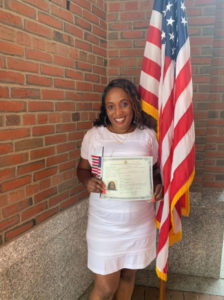
Preparing for the U.S. citizenship test requires a strong focus on reading, writing and speakingEnglish, as well as knowledge of civics. To assist those learners who are qualified to apply for U.S. citizenship, The Literacy Volunteers of Massachusetts at the Stoughton Public Library in Stoughton, MA through participation in English Now!, now offers a remote citizenship test preparation learning circle. Prospective citizenship applicants who need help with email, Zoom, and other computer-based skills receive onboarding help through one-on-one tutorials with the facilitator and, in some cases, the learning circle program helps identify a “tech buddy” in the participant’s household to ensure they can log in and join the group session each time. Participants who passed the exam can easily visit virtually with the group to recount their interview experience and share tips. The program originally only recruited students from this suburb near Boston, but now that it is permanently remote, the program’s reach has expanded. Learners use USA Learns Citizenship, YouTube videos, and videos on the USCIS (United States Citizenship and Immigration Services) website outside of class to extend their learning.
